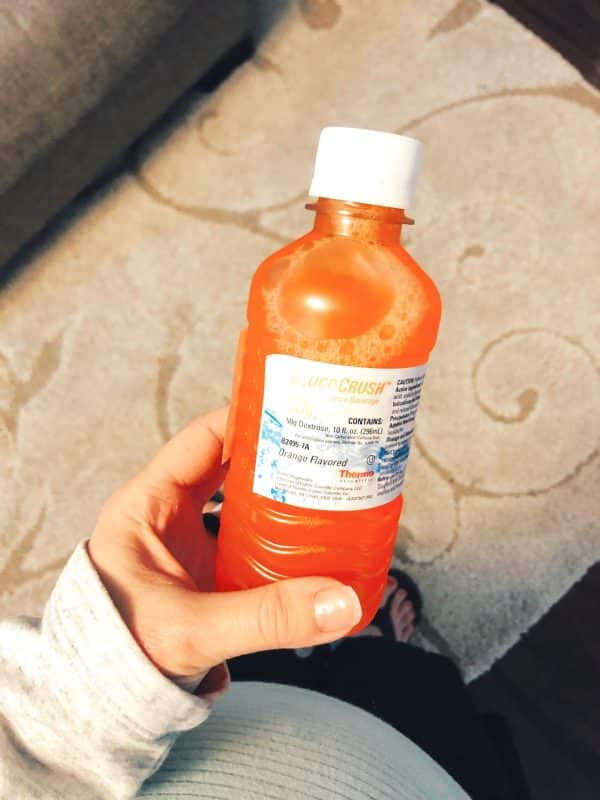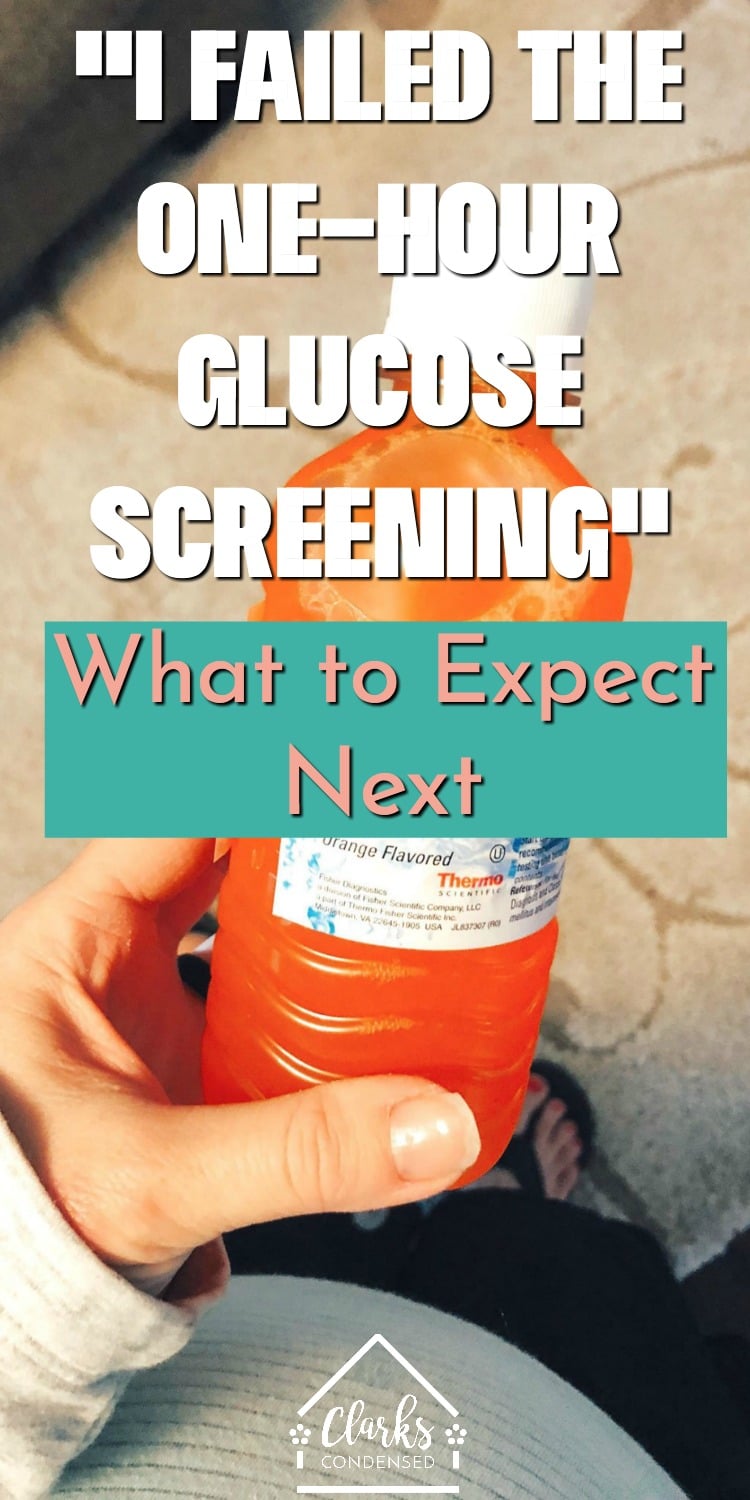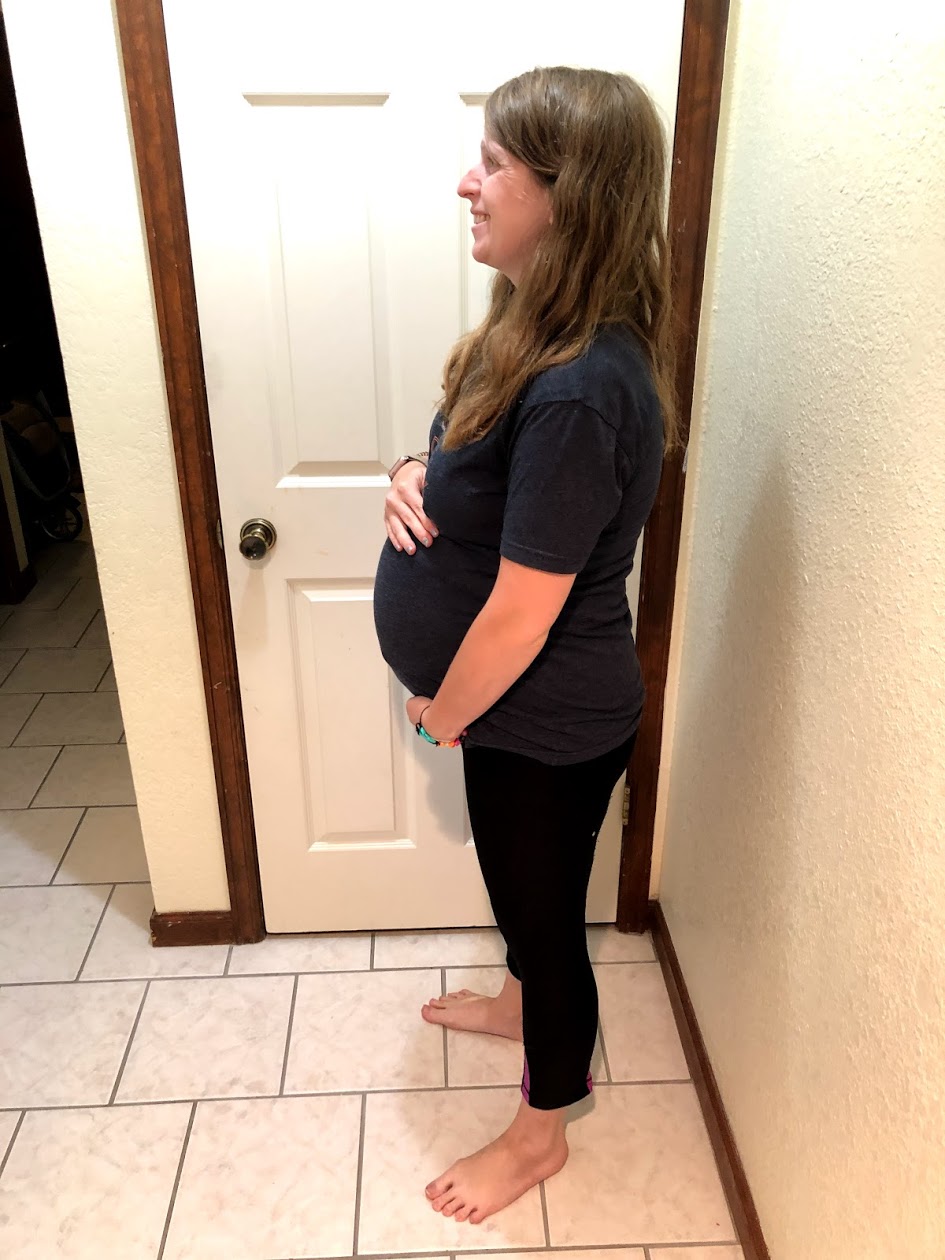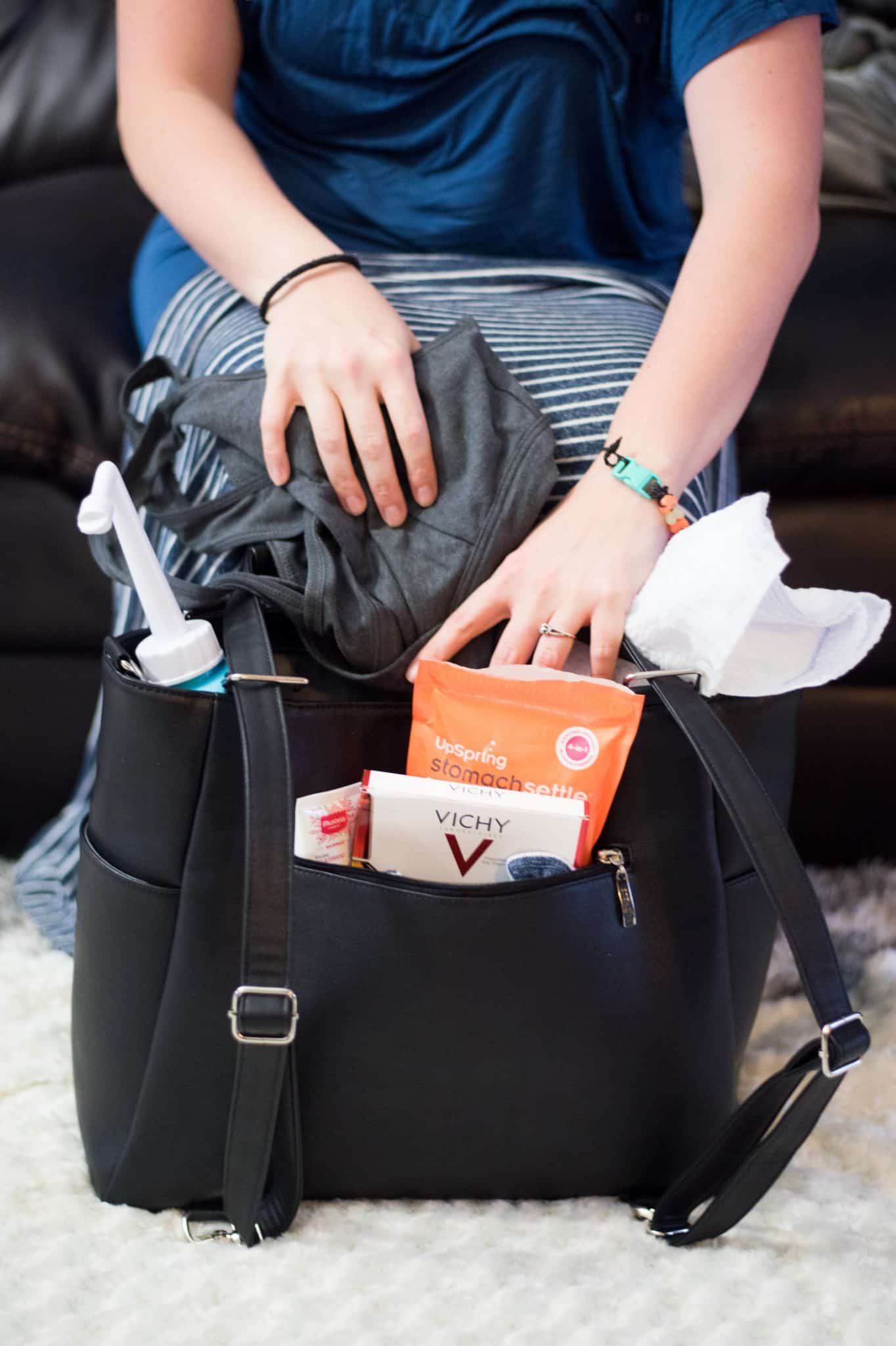“I Failed the One Hour Glucose Test” – What to Expect Next
Did you fail the one hour glucose screening test? You aren’t alone! Here’s what to expect next and answers to all the questions you might be having.

Failed 1 Hour Glucose Test
“I’m sorry, but you failed the glucose tolerance screening.”
In 2 of my 3 pregnancies, this is what the nurse said on the other end of the phone.
And both times I felt like I was punched in the gut.
Despite knowing that MANY women fail the test and that there’s really not a lot I can do about it, I always felt like I’ve failed my child somehow when I heard those words.
I remember when I got that phone call when I was pregnant with Jack, I was in the middle of the grocery store, and I just burst into tears.
This time, I was about to walk into the Art Institute of Chicago with a few friends.
I thought I was okay, but the longer I was in that museum, the more distressed I felt – especially when I heard the number I failed by was so high.
With Jack, I only failed by a few points, and the nurse assured me over the phone that the chances of me failing the three hour were pretty low.
But with this one, I just knew the results would be different – especially because I had been noticing that sugar had been making me feel rather miserable during this pregnancy.
Because I was out of town for the next week or so, I arranged to go to a lab in Forrest’s hometown (where I would be in a few days), just so I could get the test over and done with.
The test went off without a hitch, and I had to wait a few days for the results. My doctor’s office usually was quick to call, so when three days past, I figured I was in the clear.
Well, this time I wasn’t so lucky. My results finally posted online the Friday after I had the test done, and I found out I had a failed glucose test hours two and three by a few points.
So, unfortunately, I was one of the unlucky ones who actually ended up diagnosed with Gestational Diabetes. My levels were just barely elevated (in fact, my fasting was probably too low), and so far I’ve been able to manage it well with diet alone…but that’s a post for another time.
This post is for anyone who failed and is wondering what happens next when you fail the one hour test. Even though MANY women fail the one hour and don’t have Gestational Diabetes, it still can be very emotional – and with everything, knowledge is power.
If you do end up being diagnosed, be sure to check out this post – The Ultimate Gestational Diabetes Food List.
Please be aware that I am not a medical provider or professional. This information is based on my experience and research. Always stay in contact with your trusted medical provider before making any decisions.
Join our New “Thriving Through Gestational Diabetes” Facebook Community!
Why do I need a glucose test?
A glucose test is typically recommended during pregnancy because of the increased risk of Gestational Diabetes in pregnant women. Gestational Diabetes can cause significant issues in both mom and baby, and there can be extra monitoring required with the diagnosis.
While there moms who are pre-disposed to Gestational Diabetes, it can affect any mother unknowingly, so the test is important to catch those that have no pre-exisiting conditions.
How are the first and second glucose tests different?
During pregnancy, there are two glucose tests that you might take. The first one is generally recommended for all women and it “casts a wide net.” The second one is recommended for those who “fail” the first test. Here is a little more information:
- First glucose test: The first glucose test, also known as the glucose challenge test (GCT), is usually performed between 24 and 28 weeks of pregnancy. During this test, you will be asked to drink a sugary solution (typically called Glucola), and your blood sugar levels will be measured one hour later. This test helps identify individuals who may have gestational diabetes and require further testing.
- Second glucose test: If the results of the first glucose test are elevated, a second, more comprehensive test called the glucose tolerance test (GTT) may be recommended. During the GTT, you will fast overnight, and then your blood sugar levels will be measured before drinking a larger dose of the sugary solution. Blood samples will be taken at specific intervals over the next few hours to determine how your body processes glucose. This test provides a more detailed assessment of your glucose tolerance and can confirm whether or not you have gestational diabetes.
What is gestational diabetes?
Gestational diabetes is a type of diabetes that develops during pregnancy. It occurs when the body cannot produce enough insulin to meet the increased demands of pregnancy, leading to high blood sugar levels.
Gestational diabetes can increase the risk of complications during pregnancy and childbirth, including preeclampsia, premature birth, and macrosomia (large birth weight). However, with proper management through diet, exercise, and sometimes medication, most women with gestational diabetes are able to have healthy pregnancies and babies. Early diagnosis is key!
Failed the Glucose Tolerance Screening
Why Did I Fail?
There are many reasons why a mom-to-be has failed the first glucose test.
The first one being that you do actually have Gestational Diabetes.
The second being that the levels for failing are actually pretty low – depending on your office, to fail, you have to have a level above 130 or 140.
When you take the three hour test (which has you drinking an even higher concentration of sugar), the level to fail the one hour is 180.
The point of the screening is to catch a wide net to make sure they don’t miss anyone who *might* have Gestational Diabetes.
Because if there’s any chance you do have it – it needs to be caught and treated. Unmanaged Gestational Diabetes typically has the worst outcomes.
Do I have Gestational Diabetes if I failed the one hour test?
Not necessarily! There is a chance that you may not have Gestational Diabetes at all.
How Common is it to Fail the 1 Hour Glucose Test?
According to the March of Dimes, around 7 percent of moms in the United States end up developing Gestational Diabetes. However, a much larger percentage of mothers fail the one hour test, only to go on to pass the three hour with flying colors.
I had a hard time finding a hard and fast rule or percentage of how many, but I found a few sources stating that up to 25% of moms may fail the test.
Chances of Passing 3-hour glucose Test after Failing 1-hour test
I have honestly seen figures from 10% to 75% of those who fail will go on to pass – but I had a hard time finding an actual number.
I have personally known quite a few people to fail the test and pass the three hour, so it is pretty common.
What Happens if you Fail the One-Hour Glucose Test?
Do I really need to take the three hour test?
I see a lot of people questioning if they really need to take the three hour test when they only failed by a few points.
I’ve even been a bit surprised to see people ask if they even need to be tested for Gestational Diabetes to begin with.
Yes – if you fail, you need to make sure you don’t have it. There are some alternatives (that I will talk about in a minute), but if there’s any chance that you might have Gestational Diabetes – you NEED to know.
Gestational Diabetes – while it can be managed quite well – is a serious pregnancy complication, especially if left untreated. While most – if not all – of the complications that can come with it can be avoided with proper treatment, it’s just irresponsible to not want to find out.
The screening is important as well. There’s a large percentage of women who will get Gestational Diabetes who have ZERO risk factors. Even if you exercise every day and eat healthy, you may still have it. So it is important that you are tested.
Of course, no one can make you do anything. But be aware that many practices will not continue to see a patient who refuses the test.
How Can I Prepare for the Three Hour Test?
Honestly, I think the best thing you can do is just eat your normal diet. You shouldn’t try and trick the test – because if you have Gestational Diabetes, then you NEED to know so you can treat is as effectively as possible.
Some medical providers will recommend carb loading in the days leading up to the test, but for the most part, the recommendation is to just eat normally and then fast for 10-12 hours before you actually take the test.
You need to take the test as early in the morning as you can so you won’t have to fast all day. Plus, if you are taking it at a lab (such as LabCorp), many of them require you start the test at 8:00 AM so you are done before the employees need to take a lunch break.
When I failed the one-hour test, I tried to limit sugar and carbs substantially – and part of me wonders if that affected my results. It’s easy to read into things, and I have heard that women who eat a lower-carb diet have a higher rate of a false positive. I don’t know how much truth there is to that, though.
What Can I Expect from the Three Hour Test?
When you arrive, you will have your blood taken to get your base/fasting level.
Right after this, you will be instructed to drink 100 grams of the glucose drink within five minutes. Depending on where you are getting it done, you may be given the drink before or after you arrive – it tastes best when chilled.
As soon as you are done drinking, the clock starts, and you will have your blood drawn every hour for the next three hours. You will not be allowed to leave, and you are generally not allowed to walk around.
After your test is over, you will be allowed to eat and drink normally – make sure you bring some kind of snack. I would recommend something high in protein and low in sugar/carbs, since the drink contained a lot of that.
It’s pretty common to feel unwell or nauseated from the test. If you think you are going to throw up, make sure you tell someone in the office. If you do throw up, you will be asked to leave and come back another time.
The results can be processed pretty quickly. I had mine done at LabCorp, and they were sent to my doctor by the next morning. They weren’t posted on the LabCorp website for several days.
Here are the reference values for the three-hour test. In general, you have to fail at least two values to be diagnosed with Gestational Diabetes, but this may vary on how much you failed by and your doctor’s office protocol.
Fasting – under 95 mg/dL
1 hour – 180 mg/dL
2 hour – 155 mg/dL
3 hour – 140 mg/dL
What Happens if You Fail the 3 Hour Glucose Test?
Then you now have yourself a diagnosis of Gestational Diabetes.
If you are like me, you might feel pretty devastated and depressed at first. I felt like I had totally failed my child and my body.
I do my best to exercise regularly and be healthy – though I’d be lying if I said I didn’t enjoy a Lindor Lindt truffle from time to time.
A month before I got pregnant, my A1C was 4.7%, which is actually just above being too low. My fasting blood sugar was excellent.
However, the first thing my dietician said to me was, “I want you to know that this is NOT your fault. While there are risk factors, you really don’t fit into those categories, so I’m confident that this is purely a placenta issue.”
The Mayo Clinic says:
“During pregnancy, the placenta, which connects your baby to your blood supply, produces high levels of various other hormones. Almost all of them impair the action of insulin in your cells, raising your blood sugar. Modest elevation of blood sugar after meals is normal during pregnancy.
As your baby grows, the placenta produces more and more insulin-counteracting hormones. In gestational diabetes, the placental hormones provoke a rise in blood sugar to a level that can affect the growth and welfare of your baby. Gestational diabetes usually develops during the last half of pregnancy — sometimes as early as the 20th week, but generally not until later.” (source)
There are certain risk factors that will increase the likelihood that you’ll have Gestational Diabetes – however, there is a large percentage of women who get it and have no risk factors whatsoever.
Even if you did have risk factors – don’t beat yourself up. You can’t change your family history or the past – but you can go on to have a healthy pregnancy.
I spoke with a lot of women who felt like they were healthier than ever following the Gestational Diabetes plan, and I have to say – I feel the same way!
After you are diagnosed, your doctor’s office will likely send in a prescription for a Glucose Monitor and supplies. You can also buy one just from the pharmacy. I have heard that the Contour Next is the best – and to avoid the OneTouch Meter’s because they consistently show high false readings.
You will also be set up to meet with a dietician or nutritionist to go over the recommendations for managing Gestational Diabetes.
There are many different opinions out there, and I would suggest doing your research and having a real discussion with your dietitian.
The book, “Real Food for Gestational Diabetes” was SO incredibly helpful to me, and I believe that following it has helped me manage it so well so far. It goes against the grain as far as the ADA recommendations go, so make sure you talk with your dietician and are on the same page.
Alternatives to Three Hour Glucose Test
To be honest, I have issues with the drink they make everyone drink.
For the one hour test, it’s essentially 50 grams of sugar – and for the three hour test, it’s 100 grams of sugar.
The suggested sugar intake per day for an adult woman is 25 grams of sugar, so you are being asked to chug 2-4 days worth of sugar in five days for a test.
Seems a bit odd to me – and I could see why people who don’t normally eat that much sugar may have trouble!
You are also not supposed to exercise or really even move during the test after you drink the solution, so you are basically just sitting there, letting the drink sit.
However, it is the standard that has been accepted by most professionals, so what do I know 🙂
With that said, there are alternatives to taking the three hour test. If you really had a hard time with the one hour test, you could definitely look into these.
It seems that the standard alternative is to test your blood sugars – eating your regular diet – for 1-2 weeks to see if there is any elevation.
I’m sure this has it’s limitations (especially because Gestational Diabetes can progress the further along in your pregnancy you get), but it can give you a good idea of how your levels react.
Other alternatives include the jelly bean test – this is typically more often done for the hour test, but I believe you can do it for the three hour as well. You basically eat a bunch of jelly beans that add up to the amount of sugar in the drink and do the test as follows.
I’ve also heard of people being approve to drink Coke or a pure fruit juice with similar sugar amounts.
Some people think you can get an A1c blood test done, but from what I’ve read, this isn’t necessarily the best, since the test measures your levels from the past three months – so it’s possible your levels were fine up until just a week or two again, and that may not register with your levels.
Either way, just talk with your doctor and come up with a plan that you both feel comfortable with. Honestly, the test isn’t that bad – and it is the gold standard – so if you are okay with it, there’s really no reason to avoid it.
Well, I hope that this post has been helpful to anyone who has failed the one hour test and is looking for some more helpful information. I hope that you pass! But if you don’t – remember, it’s not the end of the world to be diagnosed with Gestational Diabetes. It’s something you have to take serious, but it’s not a death sentence.
Other Posts You May Enjoy
- Very Early Pregnancy Symptoms
- 13 Things to Know About an IUGR Diagnosis
- How to Turn a Breech Baby at 37 Weeks








Thank you for sharing! This is such a great post for moms who do fail that first test. I failed the first one with my daughter and had to go back and do the long one. Luckily I passed, but I feel for anyone who fails!!